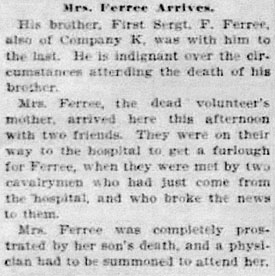Newton Ferree |
|
Quick Facts |
|
|
- Born: November 1844
- Parents: Harvey & Margaret Lowe Ferree
- Seventh generation Ferree descendant on the Philip & Leah Dubois Line
- Married: Rose E. (Unknown)
- Two children
- Career Army
- Served as Commander, G.A.R.
- Died: February 20, 1928
- Buried: Arlington National Cemetery
|
Newton Ferree was born November 1844 in Fayette County, Pennsylvania, the seventh and youngest child of Harvey and Margaret Lowe Ferree. The 1850 U.S. census shows the family living in Rostraver, Westmoreland County, Pennsylvania. At some time after that they located to Ohio. The 1860 U.S. census shows them in Steubenville, Jefferson County, Ohio.
On May 28, 1862, at the age of eighteen, Newton Ferree enlisted as a Private in the U.S. Army, Company F, 84th Infantry Regiment, Ohio. He mustered out on September 20, 1862, at Camp Delaware, Ohio. On February 5, 1864, he listed in Company C, 157th Infantry Regiment, Ohio, and was commissioned an officer on May 15, 1864.
In April 1865, Lt. Ferree was working as a clerk in the United States Paymaster's Office in Washington, D. C. On the night of April 14th he and a friend had followed a torchlight procession to Edwin Stanton's house where the Secretary was serenaded and made a speech. That night Newton Ferree became an "eyewitness to history". From a daily diary he kept, following is the entry for that night. "As the procession moved off, we went to the Falstaff House at about half-past ten o'clock I went out the front door. I then heard someone over at Ford's Theatre cry out fight. I ran over and went in and found the audience all on their feet crying out to hang someone. I jumped on the stage and learned that President Lincoln had been assassinated. I then started to go in the box where the President was but met five or six men carrying him out. I picked up the collar which had been torn from the President's neck. I then went in and found it one pool of blood. When I heard of the President being assassinated it almost set me wild". (More can be found on this website's page "Eyewitness to History" under the Gazette heading.)
Newton's father, Harvey Ferree, had a sister, Jane Davis Ferree, who married Henry Large. The Large family lived in Coraopolis, Pennsylvania; the Harvey Ferree family lived in Ohio. Letters between cousins of these two families can be found on this website. Newton's letters describe his life and activities in Washington at that time. (Go to "Large Family Letters to Counsins" under the Family Letters heading.)
Newton Ferree and wife, Rose E., were married about 1869. They had two sons, Sheridan, born about 1869, and Newton, born about 1876. The family lived in the Washington, D.C. area. Both sons had army careers. Sheridan was a 2nd Lt., Company D, 1st D.C. Volunteer Infantry. Newton was a Sgt. in Company H, 1st D.C. Infantry.
The newspaper article below appeared in The Washington Post on December 16, 1906. It states support for Newton's election as Commander, Department of the Potomac, G.A.R.
He was elected to that position. On March 4, 1907, a joint installation ceremony was held for the new officers of the G.A.R. (Grand Army of the Republic) and the W.R.C. (Women's Relief Corps). It was a grand event as described "eclipsed all previous occasions of that kind in Washington". A detailed article (with Newton's photo) describing the event appeared in the March 14, 1907, issue of The National Tribune. Below are selected excerpts from that article.
The following article appeared in The Washington Times, September 7, 1907.
Newton's son, Newton H., served in the Spanish American Cuban Campaign in 1898. Many of the servicemen in Cuba at that time contacted tropical fevers including Newton, Jr. The United States government established Camp Wickoff on Montauk Point, Long Island, NY, to place these returning soldiers where they could be quarantined until they recuperated. Newton, Jr. was among those sent there. Over 20,000 soldiers were evacuated to Camp Wickoff before it closed; 257 died while there. The article below which appeared in the August 29, 1898, issue of The Times tells of his death.
|
|
 |
|
|
 |
The Washington Post, August 30, 1898:
To Rest in Arlington - Sergeant Newton Ferree's body is Brought Home - Wrapped in United States Flag- Parents Return from Montauk and Are Followed by Sergeant Sheridan Ferree, Who is on Ten Days Furlough - Funeral Services to be Held Wednesday Afternoon at the Church of our Father - Loyal Legion Ladies to Attend |
Probably the saddest home in Washington today is the residence of Mr. Newton H. Ferree, 1720 Thirteenth Street northwest, where lie the shrouded remains of his brave soldier son, Sergeant Newton H. Ferree, Jr. , Company K of the First District Regiment, who died of typhoid fever last Friday at Montauk (NY). Sergt. Ferree is the first member of the District regiment which left this city with such hopefulness, whose dead body has been brought back for interment. Sergt. Ferree was but twenty-two years of age; he was a good soldier, and most competent drill master in the entire District regiment, and his death is deeply regretted by his comrades. When he was in the the Central High School, he was Captain of one of the companies, and upon his transfer to Business High School, he became captain of Company D, and attained an enviable reputation for drilling. He was a young man of spotless character and highly regarded for his personal qualities.
Mr. & Mrs. Ferree returned yesterday afternoon from Montauk, and were followed later in the evening by their surviving son, Sergeant Sheridan Ferree, of the same company, who accompanied his brother's remains to his city. It was with some difficulty that he was enabled to get a ten days' furlough and away from the detention camp in order to come home and attend the funeral of his brother, but when the excruciating circumstances were made known, the Surgeon General gave permission.
It was impossible to secure a casket for the unfortunate soldier at Montauk, and when the remains, wrapped in a United States flag, reached this city they were taken immediately in charge by an undertaker and prepared for burial. The funeral will take place at 2:30 o'clock Wednesday afternoon at the Church of Our Father, and interment will be made in a soldier's grave at Arlington.
Friends of the young man, and particularly those of the National Guard have suggested a military funeral, but as it will be impossible for the company of which Sergt. Ferree was a member to attend, it is probable that the services will not be attended with strictly military ceremonies. The pall bearers will be selected from among his most intimate friends, who were members of his cadet company at the Business High School. There will be a brief service at the house, and at the church. Past Department Chaplain Stevens will officiate assisted by Rev. Dr. (Henry N.) Couden, Chaplain of the House of Representatives. The ladies of the Loyal Legion, of which Mrs. Ferree has for several terms been President, and who have known and felt a deep interest in the young man, will meet in the church parlors one hour before the services and attend the funeral in a body. |
Newton Ferree died February 20, 1928; Rose died September 19, 1930; Sheridan died September 26, 1945. All are buried in Arlington National Cemetery, Site Lot 120 and Site Lot 120-A, as well as Sheridan's wife, Erna who died November 5, 1953, and their son, Sheridan, Jr. who died December 30, 1933.
|
